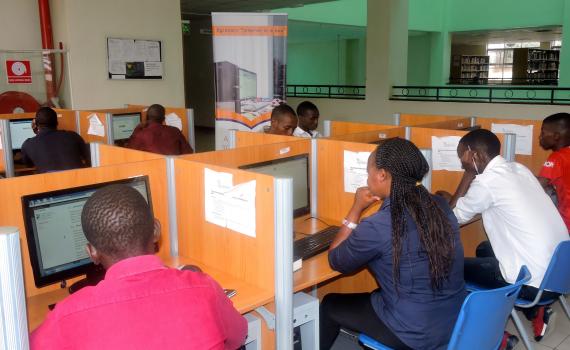
EIFL is delighted to announce a new project in Kenya that aims to help people who are studying online by creating a social learning environment in public libraries.
EIFL’s partners in the project are the non-governmental agency Peer 2 Peer University (P2PU), which promotes and facilitates lifelong learning outside of institutions, and Kenya National Library Service (KNLS), a network of 61 libraries serving communities across Kenya. The project is funded by the Information Programme of the Open Society Foundations (OSF).
HELPING LEARNERS COMPLETE ONLINE COURSES
There is a huge volume of free, high-quality courses available online. In Kenya, adults working towards a degree, out of school youth, and new graduates looking for work stand to gain a great deal from online learning materials; however, many do not have the resources, technical skills, and mindsets required to take advantage of them.
The EIFL Public Library Innovation Programme (EIFL-PLIP) is working with P2PU and KNLS to address these issues in a blended-learning pilot project utilizing the Learning Circles model. By combining online courses with face-to-face facilitation, Learning Circles make use of digital resources, but deliver them in an engaging and supportive environment.
HOW LEARNING CIRCLES WORK
Learning Circles were developed and tested by P2PU and Chicago Public Library (CPL) in the USA in 2015.
For students taking online courses, learning can be an isolated and lonely experience. Learning Circles make learning a social experience. They are lightly-facilitated study groups for learners who want to take free online courses together and who want to meet other learners in person.
Each Learning Circle comprises about eight to 15 learners. The Learning Circles meet regularly in their local public library over a period of six to eight weeks while working through their online courses. During meetings, learners discuss their courses, teach each other, share content and technical knowledge, work through problems and solutions, and motivate and encourage each other to study.
Librarians act as meeting hosts and study group facilitators, stimulating discussion and helping learners to conduct research and use online research tools.
WHY PUBLIC LIBRARIES?
The 2015 P2PU-CPL test demonstrated the advantages of public libraries as settings for Learning Circles. They found that community members were confident that they would find educational resources in the library and that librarians’ information skills and experience of supporting university and school students with their studies could be applied in Learning Circles. In addition, libraries have meeting spaces and many have computers which members of the public can access for free.
POSITIVE RESULTS
Results of the test showed that Learning Circle participants were more likely to complete courses, with retention rates close to 50% after 6 weeks (compared with 5-10% completion rates in many online courses). Moreover, 65% of participants had never taken an online course before. P2PU Learning Lead Grif Peterson commented that “we’re not just looking to see high completion rates, but rather we want to know that we’re engaging a lot of first-time online learners and they are taking what they’ve learned and are able to apply it to their life in a meaningful way.” Approximately 90% of participants were interested in attending another Learning Circle.
ADAPTING THE MODEL FOR KENYA
The new EIFL-P2PU-KNLS pilot project will adapt the Learning Circle model and Learning Circle training materials for Kenya. Two libraries are being considered for implementation of the pilot project, namely Buruburu Public Library, which serves urban and peri-urban communities in Nairobi, and Nakuru Public Library, located in Nakuru, a town of almost 400,000 people in Nakuru County in mid-western Kenya.
Librarians at the selected libraries will be trained to facilitate Learning Circles.
This will be the first time that the Learning Circles model is used in Africa. “P2PU is honored to begin working a talented and thoughtful team at KNLS, eIFL, and OSF, and excited to watch this programme grow in Nairobi and Nakuru,” said Petersen.
Lessons learnt from the pilot project, which ends in June 2017, will be used to guide development of further online learning support programmes in public libraries in Kenya and other countries in Africa.
FIND OUT MORE ABOUT EIFL’S PARTNERS
SHARE / PRINT









